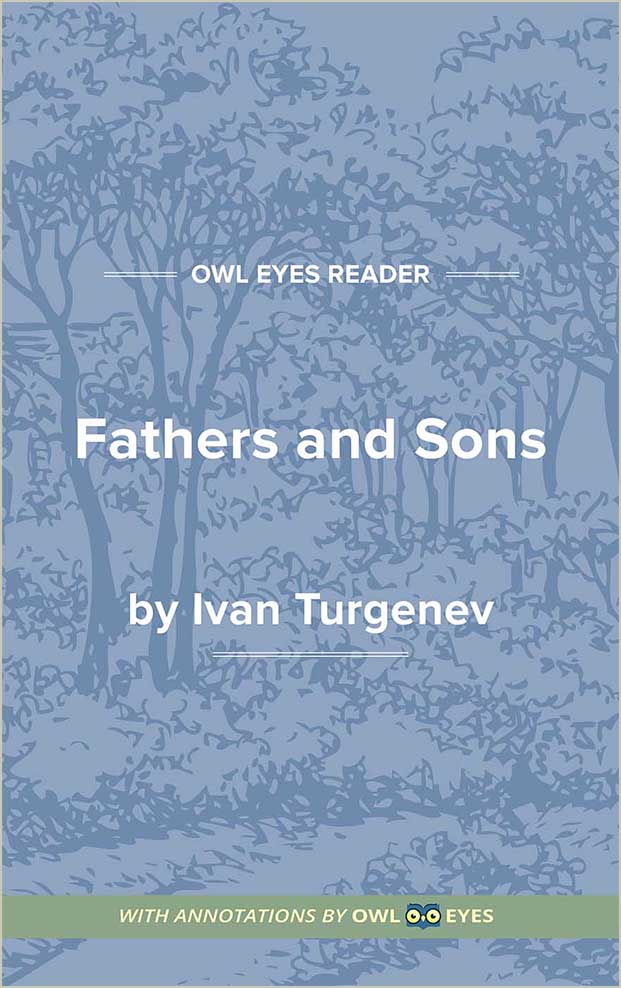Analysis Pages
Themes in Fathers and Sons
Conflict Between Generations as Inevitable: Like the title suggestions, some of the major sources of conflict are between fathers and sons. Though Nikolai loves his son greatly, he laments that, despite his best efforts to keep up with current philosophy and politics, he still can’t quite understand his son’s convictions—and thinks that there is an unbridgeable gap between them. Likewise, Bazarov’s father realizes he is unable to keep up with the extreme views of his son, though Bazarov holds his father in much greater contempt than Arkady does his. Of note is also a remembered conversation between Nikolai and his father, where he proclaimed that his father could never understand him because of the age gap between them. Though some of generational conflict is unresolved, hope of mending is not lost, as proven by Arkady and his father’s relationship. Brought together by their dual marriages, they begin to restore their closeness, while Bazarov dies without reconciling with his father.
Traditional Values vs. Nihilism’s Rejection of Authority: One of the clearest debates in the novel is the question of how much credence to give to authority and tradition. Bazarov endorses the younger generation’s tendency toward cynicism, postulating that nothing truly matters and that authoritative constructs, such as morality, are all meaningless. Meanwhile, Paul is a staunch opponent of this set of beliefs, preferring the traditional spiritual values of Russia. Though Bazarov is generally an unpleasant person to speak with, he is nonetheless charismatic and appealing enough that Arkady follows him for a span of several months. Despite the inherent conflict between the two ways of viewing the world, Arkady and his father’s reconconciliation suggests that the two can learn to understand one another. On the other hand, Bazarov’s death is tragic, perhaps suggesting that his nihilism leads to a life of unhappy unfulfillment.
The Value of Romantic Love vs. the Value of Scientific Curiosity: Bazarov and Arkady follow different paths to happiness; while Bazarov spends his free time dissecting frogs and peering into microscopes, Arkady seeks a greater human connection, eventually finding love with the kind and perceptive Katya. Bazarov, who openly disdains the concept of love, nevertheless finds himself attracted to the alluring Anna Sergievna (though his first thought at seeing her attractive body is oddly scientific, as he wonders what she would look like on the dissecting table). His confession of love to her comes out sounding like something painful he has had to force out of his mouth since it is so alien to the materialist rationality he talks about day in and day out; he is crushed when rejected. His pursuit of scientific knowledge eventually kills him, and he dies unloved—but not uncared for—by Anna, suggesting that perhaps his life could have been happier had allowed himself emotional depth earlier.
Themes Examples in Fathers and Sons:
Chapter I
🔒"but spent the greater part of his time in endeavouring to fraternise with his son's youthful acquaintances..." See in text (Chapter I)
"May, 1859..." See in text (Chapter I)
Chapter III
🔒"Yet, even as the thought passed through his mind, Spring seemed once more to regain possession of her kingdom, and everything around him grew golden-green..." See in text (Chapter III)
"But no significance can attach to the place of a man's birth, Papa...." See in text (Chapter III)
""No; I have appointed a fresh one, for I came to the conclusion that I could not have any freed serfs about the place...." See in text (Chapter III)
"threw a glance of apprehension in the direction of the tarantass..." See in text (Chapter III)
Chapter V
🔒"but also let us see how you will contrive to exist in an absolute void, an airless vacuum. Pray ring the bell, brother Nikolai, for it is time for me to take my cocoa...." See in text (Chapter V)
"(formerly we had Hegelists, and now they have become Nihilists)..." See in text (Chapter V)
"Mais vous avez changé tout cela...." See in text (Chapter V)
"it is not for a son to summon his father to judgment..." See in text (Chapter V)
""You see, I like to open them, and then to observe what their insides are doing. You and I are frogs too, except that we walk upon our hind legs. Thus the operation helps me to understand what is taking place in ourselves."..." See in text (Chapter V)
Chapter VI
🔒""A good chemist is worth a score of your poets," remarked Bazarov...." See in text (Chapter VI)

